ICICI Foundation’s Initiatives on Environment
As part of the CSR initiatives being carried out through ICICI Foundation, ICICI Bank has extensively supported efforts for environmental protection and improving biodiversity. Projects have been executed in the areas of water conservation, forest conservation and afforestation and protecting biodiversity, which are contributing towards restoring ecological balance in the country.
Supporting Ecological and Wildlife Conservation in Forests
In fiscal 2022, ICICI Foundation had launched ‘Project Vanya Jeevan’ to work towards ecological and environmental conservation and supporting sustainable livelihood of the people living in the periphery of forests. During fiscal 2023, the project has been extended to 42 forests and national parks across the country.
Some of the prominent forests where ICICI Foundation has been working in collaboration with the respective state forest departments are Sariska Tiger Reserve in Rajasthan, Tadoba-Andhari Tiger Reserve and Bhimashankar Forest in Maharashtra, Satpura Tiger Reserve in Madhya Pradesh, Bandipur National Park in Karnataka, Simlipal Tiger Reserve in Odisha and Valmiki Tiger Reserve in Bihar.
The interventions in these forests include animal safety and healthcare, making water available for flora and fauna, habitat restoration and conservation, afforestation and prevention of soil erosion. The programmes aim at the protection of carnivores, herbivores and other animals. ICICI Foundation is also assisting the communities in the surrounding villages through livelihood support, water management and initiatives to minimise their dependence on forests.

Watering hole at Sariska Tiger Reserve in Rajasthan
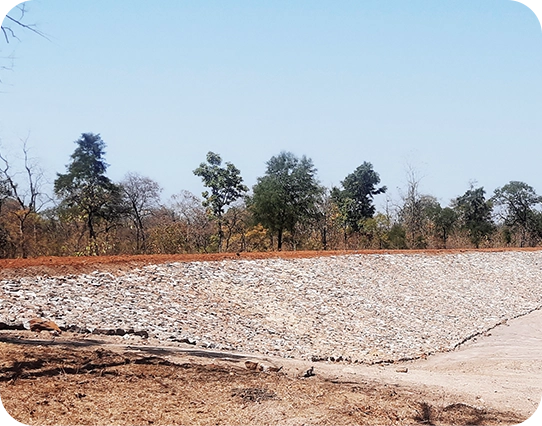
Before
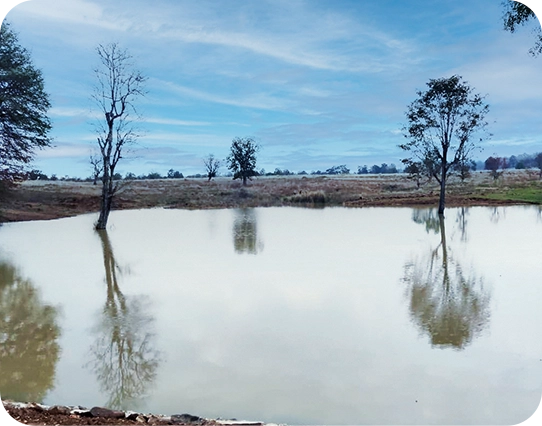
After
A pond built at Satpura Tiger Reserve in Madhya Pradesh
Miyawaki Plantation
The Miyawaki method, pioneered by the late Japanese botanist Akira Miyawaki, is a distinctive technique of plantation that mixes saplings from different species of trees that are native to an area. The resultant mixed dense plantation closely resembles a natural forest, which eventually becomes self-sustaining. In fiscal 2023, ICICI Foundation created over 50 Miyawaki forests in 48 villages in 16 districts of Gujarat, Madhya Pradesh, Maharashtra and Punjab by planting over 302,500 saplings. Over 90 varieties of saplings, including fruits, flowers and canopies were planted.
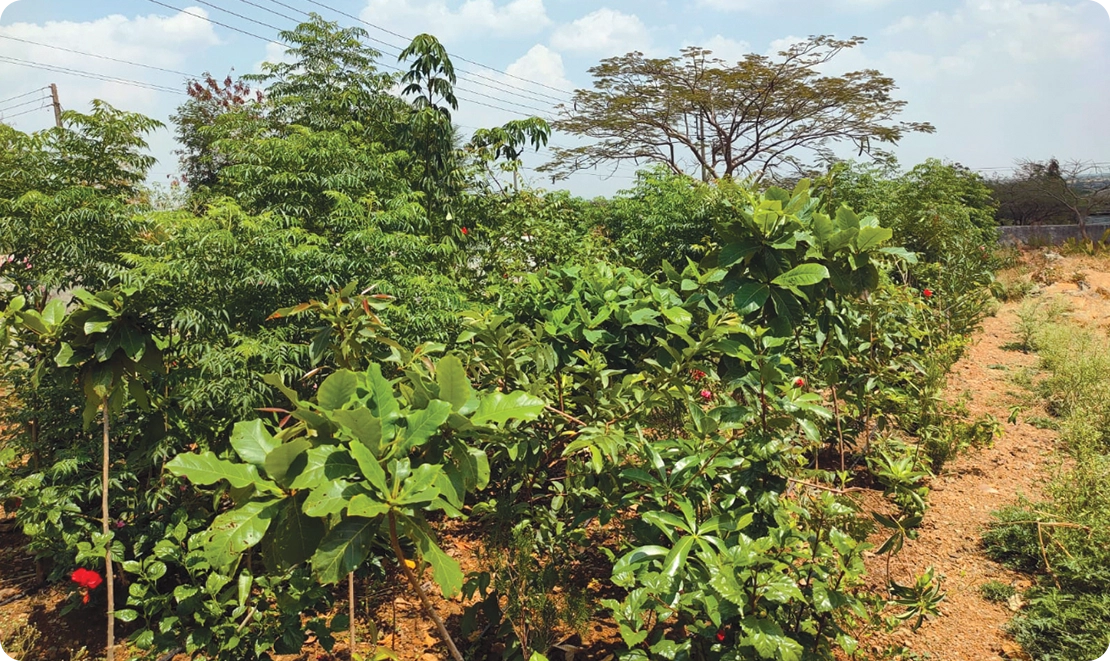
Miyawaki plantation in Latur district, Maharashtra
Expanding Green Cover
ICICI Foundation continues to invest in initiatives to conserve and nurture the environment. It has been promoting green initiatives, including avenue plantation, which involves planting trees on both sides of roads. Since inception of this initiative in fiscal 2022, ICICI Foundation has planted nearly 50,000 trees of 13 varieties across 72 kilometres in Raichur district, Karnataka and Annamayya district in Rayalaseema region, Andhra Pradesh.
Trees Planted
1.4 million
In fiscal 2023
2.6 million
Since inception
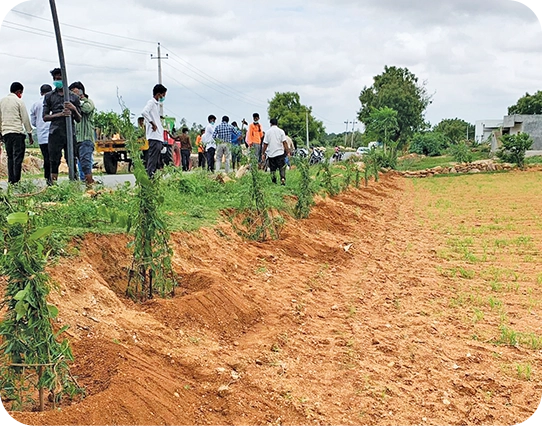
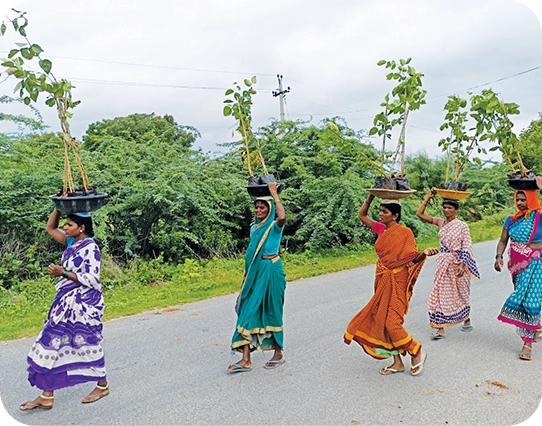
Avenue plantation in Raichur district, Karnataka
Water Conservation Efforts
ICICI Foundation engages with local authorities and administration to undertake projects relating to water conservation and rejuvenation of water bodies. ICICI Foundation’s efforts have created 17.1 billion litres of water harvesting potential annually in the country, much of which are in water scarce areas. Some of the prominent projects are detailed below:
Harvesting Rainwater in Schools
With rapid climatic changes, water conservation has become vital to India’s sustainable future. ICICI Foundation has been running a rainwater harvesting programme in schools since fiscal 2021. Till March 31, 2023, ICICI Foundation had implemented the programme in 5,800 schools. The number of schools benefitted in fiscal 2021 was 300 in 14 states. In fiscal 2022, another 2,000 schools in 21 states were benefitted. The project was implemented in 3,500 schools across India in fiscal 2023, which is more than double the number implemented till fiscal 2022. In addition, ICICI Foundation educates students on the importance of conserving water.
17.1 billion
Litres of water harvesting potential created
Rainwater Harvesting Case Study
In fiscal 2023, ICICI Foundation completed rainwater harvesting work at Government Primary School in Ghantiyali block of Chimana village in Jodhpur, Rajasthan.
The school was facing a serious water shortage as there was no tubewell or water pipeline in the area. The villagers used to help the school by providing some water which was insufficient to meet the needs of the children. Water shortage became so severe that parents started shifting their children to other schools despite being in distant villages.
ICICI Foundation’s rainwater harvesting project increased water availability in the school and ensured regular water supply throughout the year. The project equipped the school with 50,000 litres of total rainwater harvesting capacity. Access to clean and safe rainwater improved the hygiene standards of the school, the overall health of students and staff. This further led to increased attendance and concentration, thereby enhancing the academic performance of students. Enrolments in the school also went up from 45 in fiscal 2022 to 105 in fiscal 2023. The project had a ripple effect and inspired other schools and communities in the region to implement similar initiatives.
Harvesting Spring Water in North Eastern Region
Springs are a perennial source of water in the forests. However, due to rapid deforestation, some natural springs were drying up and causing water scarcity in the north eastern region. The forest dwellers of Manipur and Meghalaya had to spend a significant portion of their income to purchase water, especially, during summer. To address this problem, in fiscal 2022, ICICI Foundation had set up a spring water harvesting unit to channelise the spring water through water pipes to four villages in Lamdeng area of the Langol Reserve Forest in Manipur. The Foundation continued with this initiative in fiscal 2023 and installed 25 more spring water harvesting units, each with a storage capacity of 15,000 litres of water a day in Kangpokpi, Chirachandpur, Imphal East and Imphal West districts of Manipur and Ri Bhoi district in Meghalaya. This has made the forest dwellers realise the significance of forests in everyday life and become its protectors.
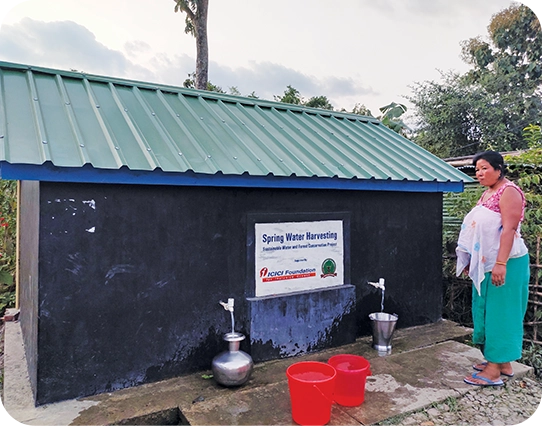
A spring water water harvesting tank in Lamdeng village in Imphal West district, Manipur
Installation of Solar Power in Rural Schools
The remote hilly district of Ri Bhoi in Meghalaya lacks proper teaching infrastructure. Most schools in this rural area face the problem of infrequent or erratic electricity supply. Irregular power supply adversely affected computer education in these schools while many computers also got damaged as a result of the voltage fluctuation.
In fiscal 2023, ICICI Foundation decided to support rural schools in Meghalaya through installation of solar power facilities. It identified 30 schools in the two blocks of Umling and Umsing in Ri Bhoi district. The installation of solar power is helping the schools run their computer classes without disruption. The schools are able to operate essential electrical equipment such as lights, fans, computers, projectors and charging stations for devices without interruption. This has helped improve the quality of education and learning outcomes of students through the use of multimedia and digital resources as well as technology-led innovative teaching methods.
The solar-powered schools can extend their study hours beyond daylight, particularly in regions with limited daylight hours or scarce electricity. The excess solar capacity is being used to power the households or community centres. This is enabling community development and improvement in the overall standard of living in the district’s rural areas.
Other benefits of the initiative include:
- Minimising usage of fossil fuel and consequently lower GHG emissions.
- Reduction in carbon footprint of the villages.
- Long-term cost savings for schools by reducing expenses on grid electricity.
- Funds saved being redirected to other educational resources or infrastructure development.
The initiative is thus empowering students, teachers and communities by providing access to clean and sustainable energy sources, and also yielding economic benefits for the schools.
Over 2,000
Schools are solar-powered
5 MW
Total capacity
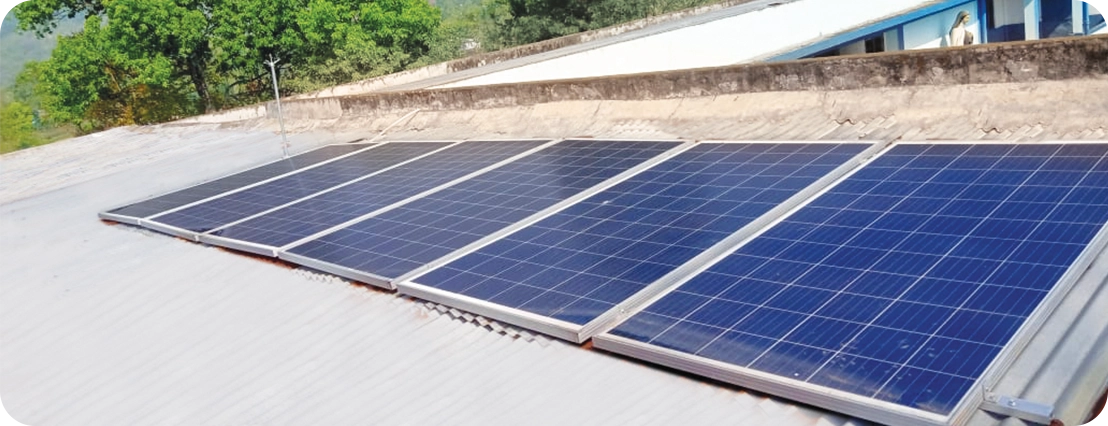
Rooftop solar panel at a school in Ri Bhoi district, Meghalaya
Making ‘Zero Burning Villages’
Farmers of some states in northern part of the country burn Parali (paddy straw) during October-November every year to clear the fields for sowing of Rabi (winter) crops. This severely affects the air quality and damages health of the soil, which impacts agricultural productivity, as well as the health of people associated with such activities and those around them. It is estimated that the Parali burning typically worsens the air quality by 30% and increases the cost of agriculture by ₹3,000 per acre.
In fiscal 2023, ICICI Foundation decided to intervene with a programme to encourage farmers to end the practice of stubble burning and for the purpose, reached out to more than 120,000 farmers across 853 villages. The programme involved spreading awareness about the detrimental effects of Parali burning and providing alternatives for utilising the crop stubble to enrich the soil as raw material for producing CNG, extracting oil and making high quality cardboards.
During fiscal 2023, this initiative saved 498,285 acres of land from burning, curbing emissions of CO2 by 1.92 million tonnes and methane by 110,000 tonnes, according to the assessment provided by Punjab Agricultural University. Further, 600 villages were declared ‘zero burning villages’ by Gram Panchayats or District Agriculture Officers of the villages.
1.92 million tonnes
CO2 emissions curbed
110,000 tonnes
Methane emissions reduced
Harnessing Sustainable Practices
ICICI Foundation started a pilot project in fiscal 2023 in 48 villages wherein it provided environment-friendly and sustainable solutions.
Villages typically record high CO2 emissions due to the absence of a proper method to segregate and collect waste, and use of firewood and traditional chulhas (stoves) for cooking. To address this problem, ICICI Foundation provided 3,520 smokeless chulhas to villages to reduce indoor air pollution and promote cleaner cooking practices. It has also provided 785 dustbins to individual families and communities to segregate garbage into dry and wet waste in order to appropriately manage and dispose of waste. It has further provided 1,210 vermicomposting beds to generate nutrient-rich compost that can be used in agriculture and foster sustainable farming practices. Additionally, ICICI Foundation carried out plantation activities in these villages, which would help in carbon sequestration, a process for capturing and storing atmospheric carbon dioxide.
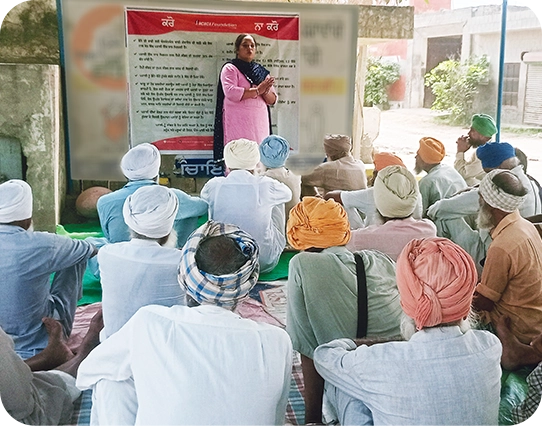
Awareness camp on Parali burning at Raipur village in Mansa district, Punjab
Distribution of smokeless chulhas at Kunariya village in Kutch district, Gujarat